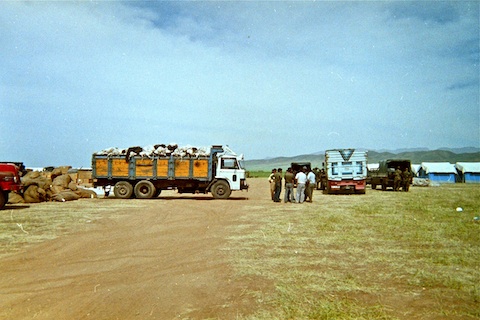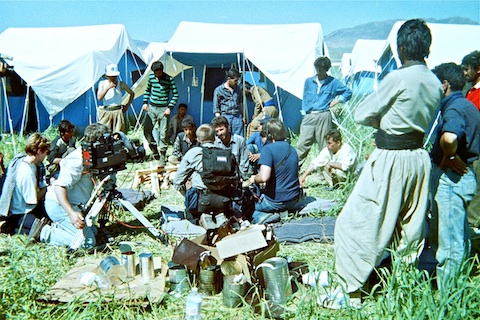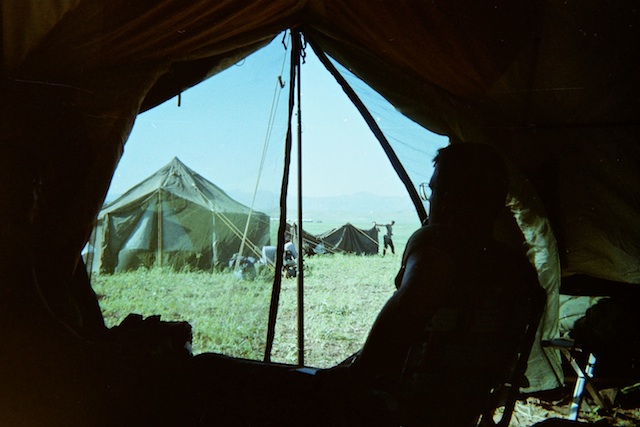The Kurdish Detour
Zakho, Iraq—Life in the camp must have been a vast improvement for the Kurds after what they had been experiencing in the mountains. From an American point of view, it was worse than primitive. Thousands of tents, three to a side, formed a small neighborhood with its own latrine positioned at one corner. Though the arrangement was too tight by American standards, the closeness of the tents and the latrines promoted ownership of the neighborhood, thereby assuring more cleanliness and less theft.
Four “neighborhoods,” also called zozans, were then arranged into larger squares termed blocks; four blocks represented a village; four villages in turn comprised one of the five major groupings, known as sub-communities, into which the entire camp was divided. The same pattern was used for the second camp run by the 432nd.

The reason for the four-layered arrangement of the camp was to facilitate the assignment of tents and the distribution of food and supplies. Nothing however could be done to facilitate the jobs of the interpreters, who were the front line of the 432nd’s war on confusion which plagued the Kurds in their never-ending search for necessities. The system was even further complicated when some of the Kurds tried “double-dipping” in the system. Double issues of food and supplies could be obtained by registering for tents in the camp and then obtaining food in the distribution center in Zakho by claiming a residence there. At times it seemed like twenty percent of the camp was vacant because people who were assigned tents were actually living in town. Eventually a security system had to be set up when people living elsewhere tried leaving with their tents. CPT Watson, the Cattleman from Kuwait, was now employed as Sheriff. His Kurdish deputies successfully reduced much of the “tent rustling” that had been going on.

McMurry’s Notes
- Chameju, Iraq—There was no required uniform at the SF base camp. Even the company command sergeant major walked around shirtless, in shorts and sandals. When a general would fly in for a visit, the CSM would run around telling everyone to get spiffed up. Then the general would land, take a look around, be happy that we were so squared away, leave and the uniforms would come right back off. We were happy because we were treated like adults who knew when we had to wear certain bits of uniform and carry certain types of gear; the general was happy because what he didn’t know didn’t hurt him; and the CSM was happy because the general was happy. It was a vastly better situation than I later experienced in Bosnia, where the chain-of-command micro-managed the same situation — even to the point of ordering flak jackets and gas masks to be worn at all times. The ironic thing is that the situation in Kurdistan was potentially much more dangerous because of the heavily armed guerillas all over the place.
- May 15 letter home
- I left the mountains for Zakho in mid-May. The company had been divided into two sections, one responsible for setting up each of the two refugee camps we were assigned. Since Camp 1 was almost done, the first section spent most of their day sun tanning or playing cards. I could have easily blended into that crowd, but I’m the type of person that needs to stay busy. I would have been bored senseless otherwise. So I found myself a job working in Camp 2. I spent a few weeks in Captain Len Beekman’s food distribution center, then a week helping transfer Kurds to Camp 2 from Camp 3. The days were long, and the work hard, but I feel that it was in Kurdistan that the 432nd earned it stripes. Yeah, there was no uniform and plenty of beer, but we got more done in the few weeks we were there than we did in the months we spent in Saudi Arabia and Kuwait. The military must have thought so too, because the 432nd recieved the Presidential Unit Citation, the highest unit award in the U.S. military.

Inside a GP Small. The good civilian tents went to the Kurds. - By late-May it was so hot down in the valleys that when I got a fever and really high temperature I kept cooler by sitting out in the sun than in our dark-green, heat-absorbing tent.
- The guys in my step-Dad John’s Kiwanis club sent me a GameBoy while I was at Camp Redeye, the part of Camp 1 in Zakho, where U.S. troops lived. I played so much Tetris that I got as sick of it as I had of UNO in Kuwait. It didn’t take long for me to max out on the highest level. When I told someone about my tremendous feat, he didn’t believe me. So I did it again. Four more times.
| Page 26 | Page 27 | Page 28 |
